Up to one-third of all Australian and US companies could be "Zombies"
Since 2019, we have been warning about the rise of "zombie companies" kept alive by perpetually cheap money care of the near-zero interest rate and QE-to-infinity policies of profligate central banks in the period following the GFC. The worry is that as interest rates now normalise, many of these zombies could fail to survive, creating waves of corporate defaults the likes of which has not been seen since the 1991 recession in Australia and during the GFC in the US.
We have, therefore, updated our quantitative zombie detection models to cover both Australia and the US. And we have stress-tested some of the definitions of what is, and is not, a zombie. The standard definition for a zombie is a company that meets two tests:
- They have existed for more than 10 years, and
- They have an interest coverage ratio (ICR) of less than 1 for 3 years in a row.
There are other more complex definitions that we employ, but this will suffice for our public research. So the ICR is defined as the ratio of a company's earnings before interest and tax (EBIT) relative to the interest (note, not principal) repayments on their debt. If the firm's ICR is less than one, it is not earning sufficient income to repay the interest due on its debt. Hence the "zombie" moniker.
Using this definition, Coolabah finds that over 13% of all ASX companies are zombies, which is actually slightly above the number of zombies we find in the US, which is just under 10% of all listed firms. Our US analysis includes all NYSE and NASDAQ listed companies.

The age constraint on a zombie does not make a great deal of sense. Just because you are a young, high growth firm, if you are not generating sufficient profit to service your debts you are still technically a zombie. So in our first adjustment, we remove the minimum 10-year age criterion, and simply focus on all firms that have reported ICRs less than one for 3 years in a row. The first panel in the table below summarises the results.
In Australia, an incredible 34% of all ASX companies would be classified as zombies as judged by their ability to produce sufficient EBIT to cover their interest repayments. This is up from the 13% of zombies we estimated in the table above, albeit imposing a minimum 10-year age requirement (ie, accounting for companies of all age, the zombie penetration jumps from 13% to 34%). In the US there is also a jump in the market share of zombies from 9.6% to 18.9% once we remove the age criterion.
As a final exercise, we classify companies as zombies only using the data from their last financial year alone, as opposed to requiring them to have ICRs less then 1 for 3 years in succession. The final panel of the table below shows that the zombie share rises further to 39% in Australia and 37% in the US.
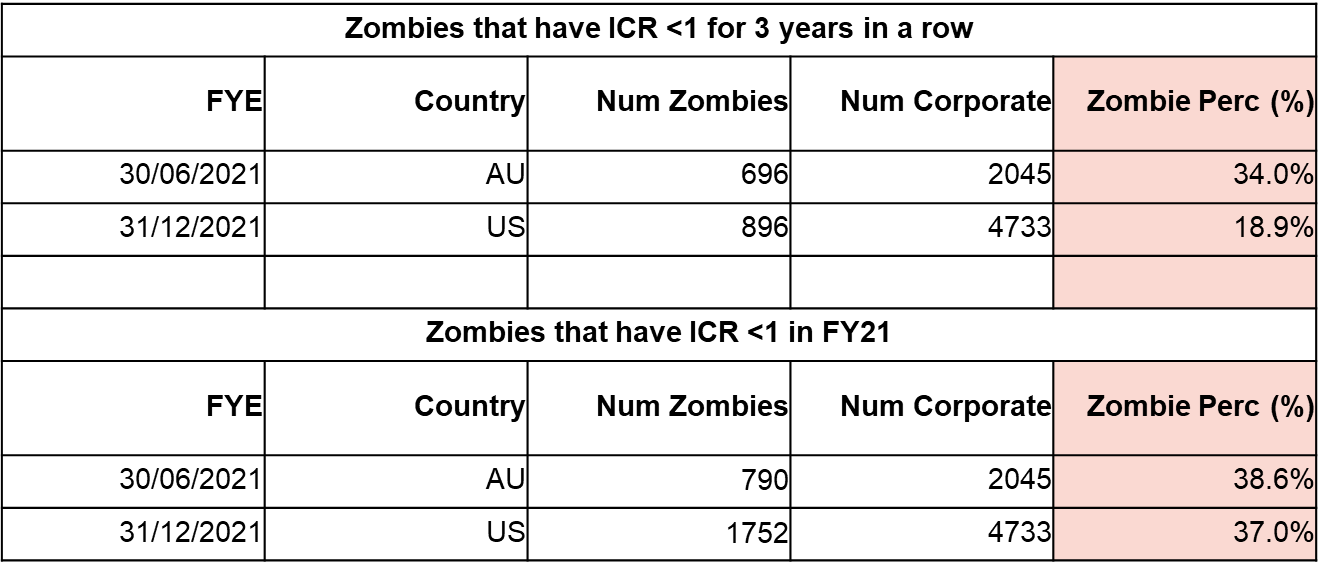
After identifying the zombies, we then studied their propagation across both industry sectors and by size or market capitalisation. The charts below summarise the findings. This analysis reveals that zombies tend to be small-to-medium-sized companies.
They are also found in greater numbers in the technology, energy, healthcare, real estate, and materials industry sectors. One final point is that if you distribute firms by their ICRs, you find that there are a lot of very risky zombies contrasted against a significant number of incredibly low-risk firms, and not as much in between. It seems that in the corporate world, you are either a good guy or a bad guy! Or maybe what we are saying is that there are a lot of deep value stocks and also loads of junk-like growth wannabes. Given the outlook for interest rates, it is hard to imagine that there will be much global growth for the next year or two - recessions are more likely.
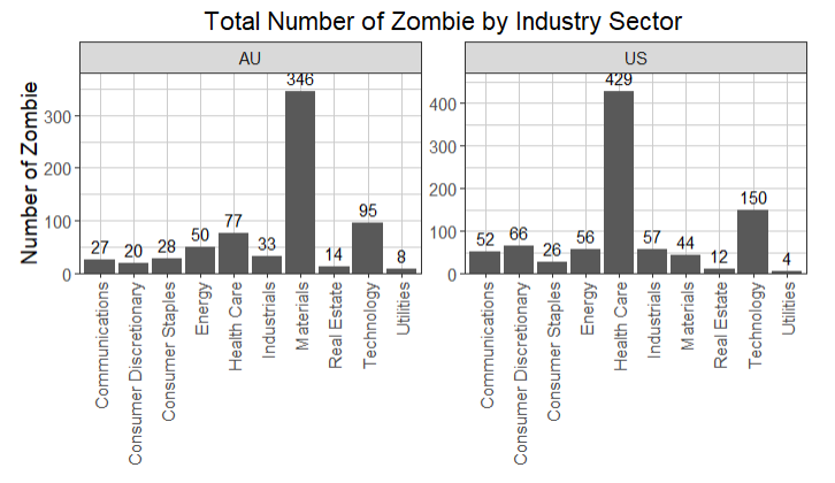
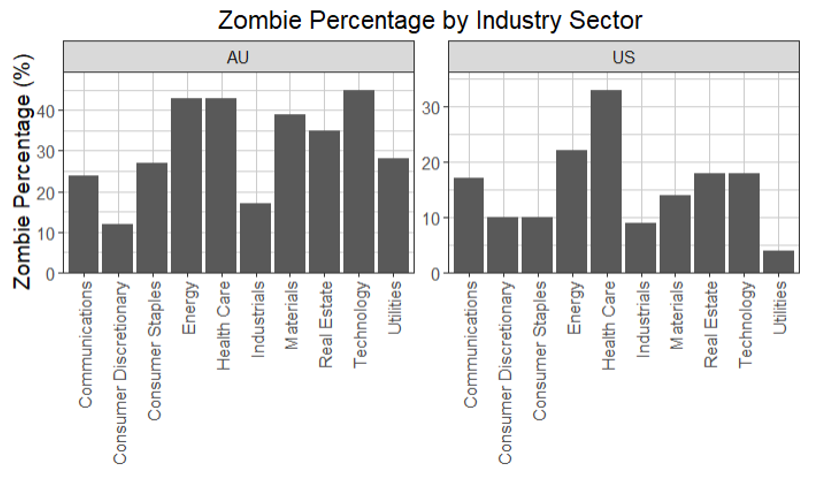
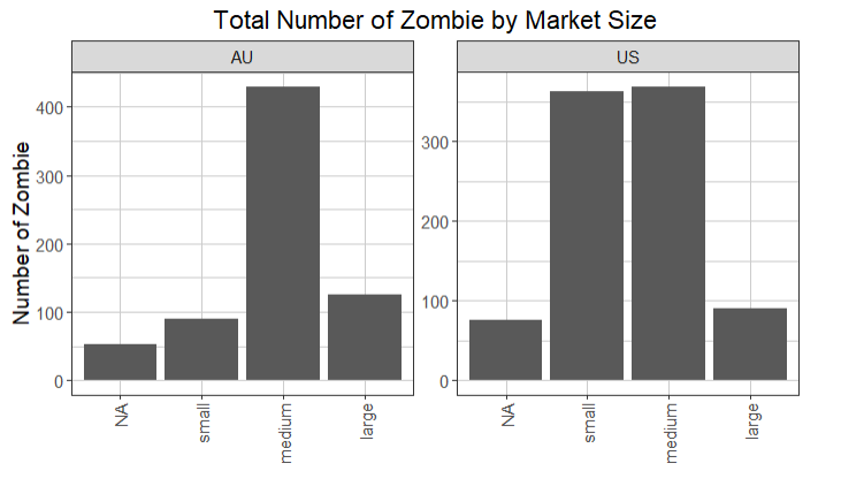

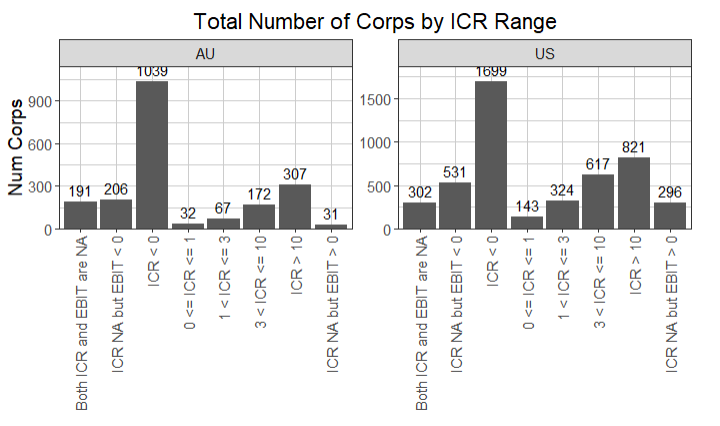
This has implications for markets. As interest rates continue to climb, we are likely to see the first interest rate-led default cycle in Australia since 1991. In the early 1990s, ANZ and Westpac almost went bankrupt because of their loan exposures to the commercial property sector.
Since the 1991 recession, we have also seen a big increase in "non-bank" lenders, many of whom provide finance to zombies, and don't have the risk management experience of lending during the 1991 recession, the tech-wreck, or even the GFC.
Whereas highly rated bond markets (eg, BBB to AAA rated securities) have generally repriced substantially, and are trading on credit spreads that are starting to look quite cheap compared to historical benchmarks, high-yield and sub-investment grade debt markets still appear dear or rich. As one example, consider the current credit spreads on US high-yield bonds rated B and BB, as highlighted below. Observe that current spreads remain well inside the much wider levels that emerged in all prior shocks, including 2020, 2015-2016, 2011-12, 2008, and 2002.

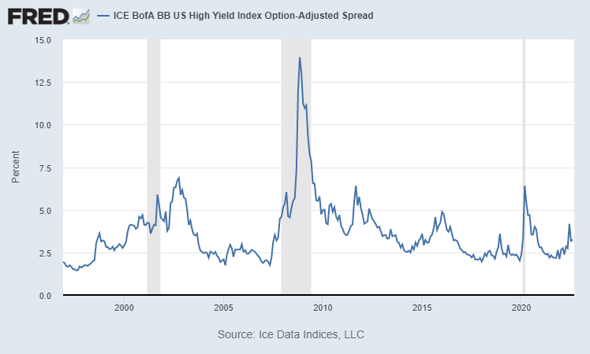
Coolabah has developed and uses automated global high-yield bond default forecasting models, and they are currently pointing to a substantial increase in high-yield defaults. Our US recession forecasting models are likewise signaling a very strong likelihood of a US recession, as they have been doing for many months. All of this means that high yield spreads are likely to have to move a lot higher, crushing many of their zombie companies...

4 topics

